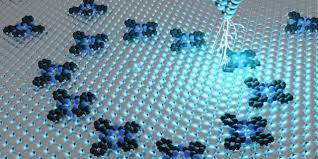AI Breakthrough Enhances Nanotechnology
Science & Technology SciencePosted by NewAdmin on 2025-03-17 09:00:12 |
Share: Facebook | Twitter | Whatsapp | Linkedin Visits: 68

AI is revolutionizing the field of nanotechnology, particularly in autonomous molecular assembly. Researchers at Graz University of Technology are working on an innovative approach to building complex nanostructures using AI-driven techniques. Their primary focus is on quantum corrals, which are nanostructures capable of trapping electrons and leveraging their wave-like properties to induce quantum-mechanical interferences. Traditionally, these quantum corrals were made from single atoms, but the research team is now exploring their construction using intricate molecules, which could broaden their potential applications in quantum computing and information processing.
This interdisciplinary effort combines expertise from artificial intelligence, theoretical physics, applied mathematics, and chemistry. The team is developing machine learning models that can autonomously position molecules without disrupting their delicate structures. One of the leading AI researchers, Bettina Könighofer, ensures that the algorithms are trained to perform precise molecular assembly without causing structural damage. In parallel, theoretical physicist Jussi Behrndt is modeling the fundamental properties of these nanostructures, while Markus Aichhorn translates these theoretical findings into real-world applications. Experimental work, conducted by Leonhard Grill, uses scanning tunneling microscopes (STM) to validate the AI’s ability to build and manipulate molecules at the nanoscale.
The potential impact of this research is immense. AI-driven nanotechnology could lead to self-assembling materials, advanced quantum circuits, and ultra-precise drug delivery mechanisms. Additionally, the integration of AI in nanofabrication processes may enhance material efficiency and reduce costs in the semiconductor and pharmaceutical industries.
As researchers continue refining these AI models, the fusion of artificial intelligence and nanotechnology is expected to redefine materials science, electronics, and molecular engineering. The next phase of this project aims to scale AI-driven molecular assembly, making it a cornerstone technology in next-generation computing and industrial manufacturing.
Search
Categories
Recent News
- Blue Cloud Softech's $150M Edge AI Chip Venture
- Nuclear Diplomacy Revived: US and Iran Resume Talks
- Curiosity Illuminates Mars: Unveiling the Red Planet's Night Secrets
- Telangana's Cybercrime Conclave: AI Takes Centre Stage
- SEIL's Rs 20 Crore Hospital Project: A Milestone for Rural Healthcare
- India's Strategic Patience: Navigating US Trade Tensions
- Cyclone Ditwah: Andhra on High Alert as Storm Approaches
- Fiscal Focus: Navigating the Path to Economic Stability
Popular News
- Navigating IPO Market Dynamics Amid Volatility and Regulatory Changes
- Massive Worldwide Microsoft Outage Disrupts Multiple Sectors
- Panjapur Bus Stand to Reshape TNSTC Routes
- తెలుగుదేశం పార్టీ - పేదరికాన్ని నిర్మూలించడంలో వాగ్దానం
- Universities Embrace Remote Learning Technologies Amidst Ongoing Pandemic